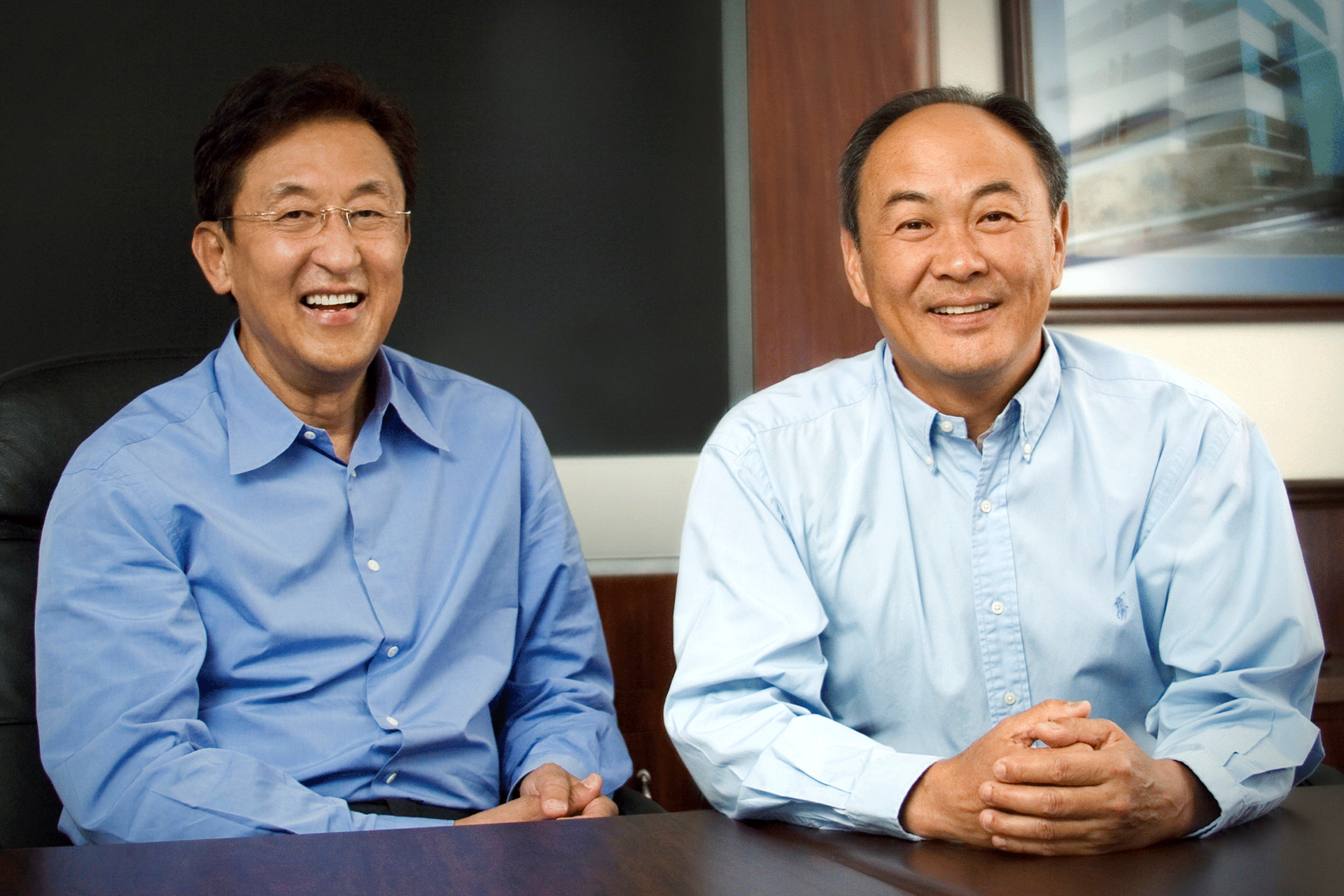
John Tu and David Sun, CEO and COO of Kingston Technology, respectively, have been business partners for nearly four decades.
COURTESY KINGSTON TECHNOLOGIESBillionaire John Tu, 79, who cofounded computer memory maker Kingston Technology, has committed $50 million to Fluxergy, a diagnostic testing firm cofounded by his son’s childhood friend. It is his first foray into biotech, and one that has a shot at the big time if the company can get its Covid-19 test approved and on the market before the pandemic starts to wind down. He has faced that kind of pressure before, entering the computer business when PCs were still new and surpassing and surviving competitors.
Born in China, raised in Taiwan and educated in Germany, Tu visited America for the first time in 1968 and fell in love with it. Back in Frankfurt, he had a job at Motorola and a good quality of life, but he always felt like a foreigner. America was different. “Nobody asked me where I was from,” he says. “I felt immediately accepted as part of this society.”
After earning his degree in electrical engineering in Germany, Tu arrived in the U.S. in 1971 on a tourist visa his sister procured for him. He followed her to Scottsdale, Arizona, but could not find work. “People jokingly said, ‘If you take a taxi, three or four times out of ten the driver has a PhD,’” Tu recalls. “That’s how depressed it was at that time.”
To make ends meet, he sold tchotchkes from Taiwan in a gift shop before discovering that in America, you can go from tenant to landlord with an 85% mortgage and a loan from your parents. Business was good at the new property he purchased, but he found Scottsdale provincial. He sold the building and headed to Los Angeles in 1975.
In L.A., he dabbled until he made the right friend in 1981. David Sun, a Taiwan-born electrical engineer ten years his junior with whom he played basketball, told him that computers would be the next big thing.
“In that case, I want to be in the computer business,” Tu said.

By the time this eye-catching ad came out in 1989, Kingston Technology was making $40 million a year in revenue, only two years after John Tu and David Sun founded the company.
Courtesy of KingstonThey did not have the money to manufacture whole PCs like IBM. Focusing on memory products allowed them to enter the market on a small scale. In 1982, they launched their first company, Camintonn, from a garage out of which Sun designed the boards while Tu sold them over the phone. Sun taught him a few key buzzwords — “parity,” “self correction” — so clients would think Tu knew what the hell he was talking about.
“I was really lucky to meet him,” says Sun, 69. “He complements what I cannot do.”
Their partnership and product thrived. In 1986, along with a third partner, they sold the company to then-IBM rival AST for $6 million, pocketing $1.3 million each after taxes.
Sun convinced Tu to invest his new fortune with a stock broker friend. By the time the market crashed on October 19, 1987, they lost $1 million each, and owed more than $200,000 in broker fees on top of that. They founded Kingston Technology that very day. Sun developed a new and improved memory board using a chip thought to be outdated by larger memory manufacturers when there was a shortage of a newer, more popular chip. It did the trick. Computer companies The boards sold faster than they could make them, and the new company achieved $40 million in sales by 1989. Four years later, they did $433 million in sales, outpaced only by consumer tech giants Samsung and Toshiba.
Tu and Sun first appeared on the Forbes 400 in 1995, each with a net worth of $340 million. The next year, SoftBank bought an 80% stake in the company for $1.5 billion, only for Kingston to buy back that stake two years later for $450 million after falling chip prices led SoftBank to offload the company.
The market bounced back, and Kingston continued to grow, but by focusing on top-notch customer service and keeping its product line relatively narrow, branching into flash drives, SSDs and memory readers; it never went public due to the duo’s disastrous market foray in the 1980s.
Tu would never call himself a visionary, and Sun would not call him one either. But Sun does credit him with a “level-headed” approach that has guided the company to where it is today, which Forbes estimates is worth at least $13 billion. “John is a good listener,” he says. “He’s the anchor.”
"how" - Google News
December 13, 2020 at 07:00PM
https://ift.tt/3oNLVWh
How Taiwanese Immigrant John Tu Built A $6.5 Billion Fortune From Computer Memory - Forbes
"how" - Google News
https://ift.tt/2MfXd3I
Bagikan Berita Ini














0 Response to "How Taiwanese Immigrant John Tu Built A $6.5 Billion Fortune From Computer Memory - Forbes"
Post a Comment